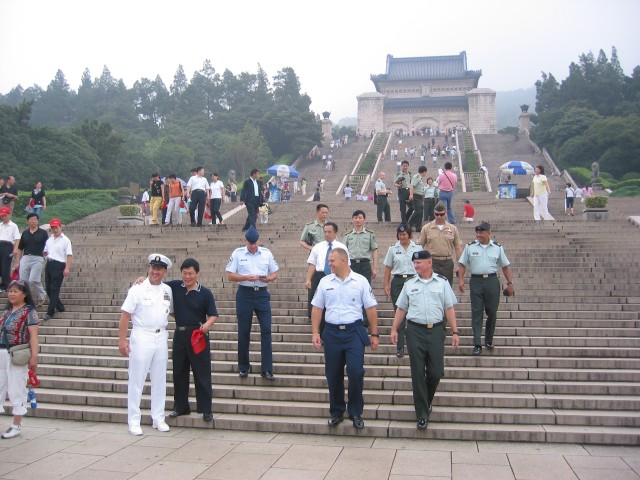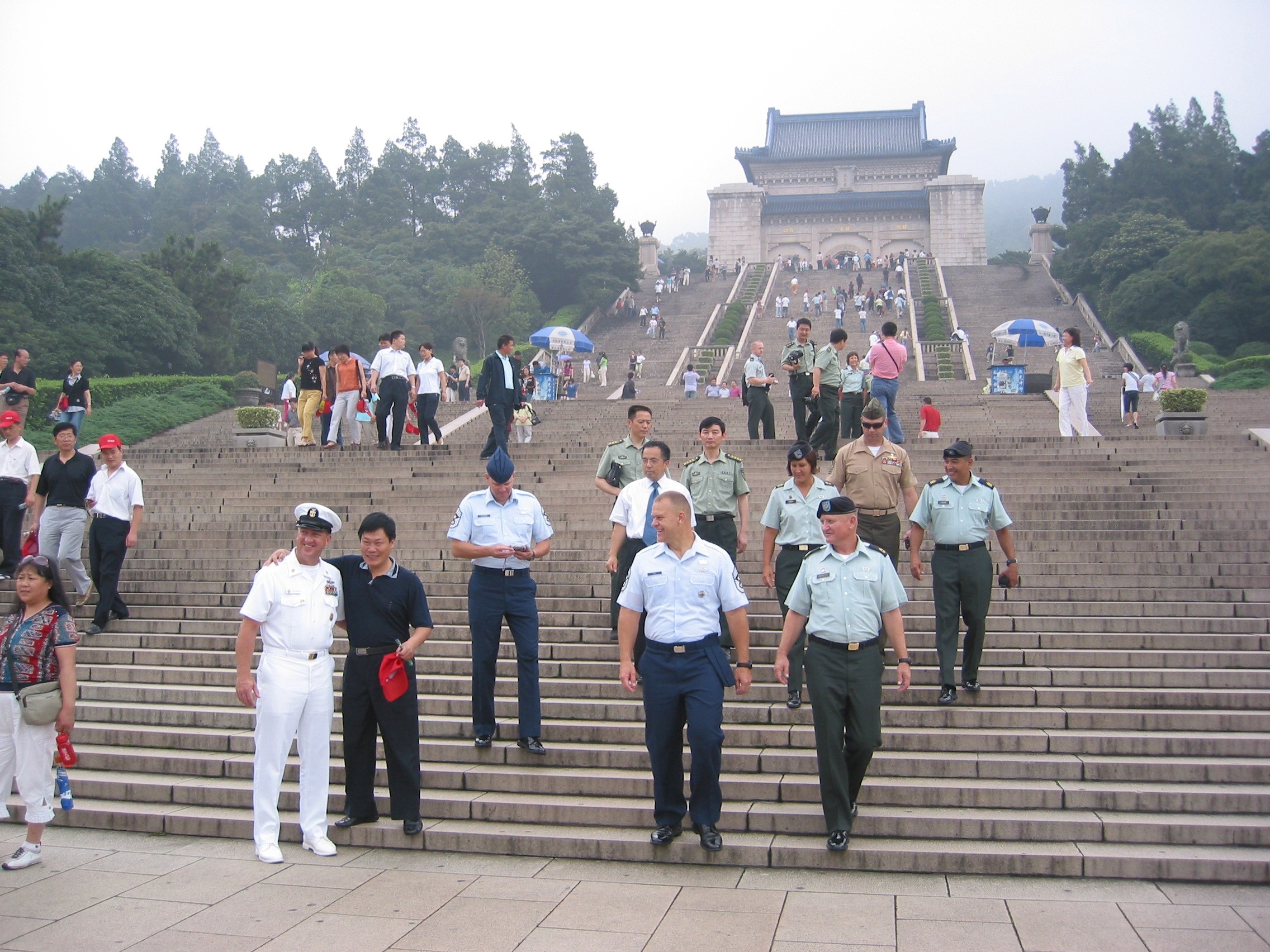
BEIJING - In August, China will welcome the world to its country as it hosts this year's Summer Olympics. Amid Beijing's last-minute preparations, the country's military took a big step and welcomed a first of its kind visit from a delegation of American military members.
The delegation, composed entirely of enlisted service members from the U.S. Pacific Command and component commands, visited China June 14-21. The visit was the first enlisted delegation to be hosted by China, and a large step toward greater transparency between the two countries and increased understanding of their militaries.
The trip began with a visit to the U.S. Embassy in Beijing where the delegation met the Defense AttachAfA, Army Brig. Gen. Charles Hooper. Hooper spoke to the delegation about the significance of their visit and his hopes for its success.
"This is historic, what you are doing here," Hooper said. "To have a senior [noncommissioned officer] delegation here is unprecedented," Hooper said. "This is historic."
The visit was coordinated by Air Force Chief Master Sgt. James Roy, senior enlisted leader, PACOM, who served as the delegation leader and echoed Hooper's sentiments.
"This is the first [enlisted] delegation, and let me say I am proud to be a part of it," he said.
The delegation's first stop was a visit to one of China's most recognizable symbols -- The Great Wall.
The delegates drove from downtown Beijing to the Great Wall. As they neared their destination, they were able to see small portions of the wall emerge, delicately clinging to the rolling mountains like a spider web stretched along a bush. It followed sharp contours as far as the eye could see.
This was the first visit for many delegation members. Most of them looked forward to visiting the wall and experiencing a part of world history. Walking up the steep stairs, sometimes at a severe angle, provided the delegation an appreciation for those soldiers who walked their post along the wall to defend China against the Mongol invasion.
"To actually be able to walk along the footsteps of those hundreds of years before you is awe inspiring," said Navy Master Chief Petty Officer Tom Howard, Pacific Fleet master chief.
The visit to the wall ended their first day of activity, but was just the beginning of their trip and their immersion in Chinese culture.
From Beijing the group traveled to Nanjing, China, to visit both cultural sites and military facilities.
Their first stop was a visit to the Nanjing Military Region headquarters for a brief about NCO development in the People's Liberation Army. There the group learned from PLA leaders the PLA NCO system started in 1978.
According to the delegation's senior escort, PLA Senior Col. Lu Bai, Department of NCO Administration and Discipline of the General Staff, Beijing, the PLA NCO system has evolved over time and has developed rules and regulations to administer the NCO program.
"The established system works well for China and the PLA," Bai said.
The PLA NCO system is similar to the U.S. NCO corps in that it has more members at the lower ranks and fewer at the higher enlisted ranks. However, the PLA NCO grades only go to level six for soldiers who serve between seven and 30 years. The PLA NCOs are also broken into two categories, technical and non-technical. Non technical NCOs, primarily small-unit infantry leaders, can only attain up to NCO level four. Technical jobs relating to maintenance and operation machinery or vehicles can go all the way to level six.
Another big difference the delegation noted was PLA NCOs serve their entire military career with the same unit and to become NCOs they have to volunteer for further service after their two-year conscript is complete.
Once the delegation received information about the PLA NCO system and how it's administered, they were ready to meet a few NCOs the next day.
After visiting the tomb of Dr. Sun Yat Sen, who most Chinese consider the father of modern China, they traveled to the home of the 179th Brigade of the PLA. The artillery brigade is home to 4,600 soldiers, 1,500 of which are NCOs.
The delegation was able to speak with a few level one through four NCOs from the brigade with jobs in infantry, reconnaissance, artillery and communications. Most serve in the capacity of a squad leader.
They learned most PLA NCOs volunteer to stay beyond their conscript for the opportunity for advanced training and the benefits of serving in the military.
"The military is like a big school," said one NCO through an interpreter. "If I stay in the PLA, I can learn more and improve myself."
After touring the base, the delegation attended a dinner hosted by the Nanjing Deputy Political commissar, PLA Navy Rear Adm. Jianzong Xu. The admiral thanked the delegation for their visit and commented on the professionalism of the American NCOs.
"This delegation has left a deep impression because it was the first for enlisted," Xu said. "Although you had a short visit in Nanjing, you left a very deep impression. The NCOs you brought are outstanding."
During the dinner, Roy summed up the purpose for their visit to China in a way that soldiers of any military can understand.
"Many people would ask why we would do this, and you can feel it in the room -- it is called camaraderie," said Roy. "This is my second time in Nanjing, and I look forward to coming again, as do the other delegates."
Following their full day in Nanjing, the delegates woke early the next morning for their trip to the city of Wuhan. The stop was coordinated at the last minute to allow the delegation the opportunity to visit an NCO academy and meet NCO candidates.
The question most delegation members wanted to know the answer to was why PLA conscripts would want to be an NCO. The answer came enthusiastically from a young NCO candidate attending the school.
"I admire the military life," said Jisong Feng, a fourth-year soldier. "After I finish my assignment here, I can go to a new assignment to use my skills."
Feng went on to explain the role of a PLA NCO was similar to that of an American NCO.
"NCOs mainly help us in our daily life," he said. "They help develop our skills."
Later that night, delegation members attended a dinner hosted by the deputy commander of the Wuhan Military Region, and were able to speak to the NCOs and NCO candidates in a less formal setting. Many members hoped the interactions they had with the PLA would foster positive relations between the two countries.
"Our candor and friendliness hopefully dispelled thoughts and beliefs," said Howard.
Chief Master Sgt. John T. Salzman, command Chief Master Sgt., 13th Air Force, Pacific Air Force, pointed out our basic similarities made it easy to relate to them.
"Even when I began getting to know them I realized they [NCOs] are just like us - just doing their jobs," he said. "They were perfect hosts. I wanted to have the opportunity to show that we are not that different in what we do. We are all driven to accomplish the mission."
As the delegation headed back to Beijing, amid the construction and preparations for next month's Olympics, they all reflected on the trip and how successful they thought it was.
According to Marine Corps Sgt. Maj. Evans McBride, U.S. Marine Corps Forces, Pacific, Sgt. Maj., the most important goal for the trip was to build mutual understanding.
"The highlight of my trip was the dialogue between the PLA and us," he said. "That is priceless. I can't overstate how important that was."
Howard agreed and said greater communication could help each military understand the other.
"The most important aspect of this trip was to begin bridging the gap of understanding," Howard said. "I think militaries throughout the world are similar in many things. The challenge is to fully understand the culture that defines the military."

Social Sharing